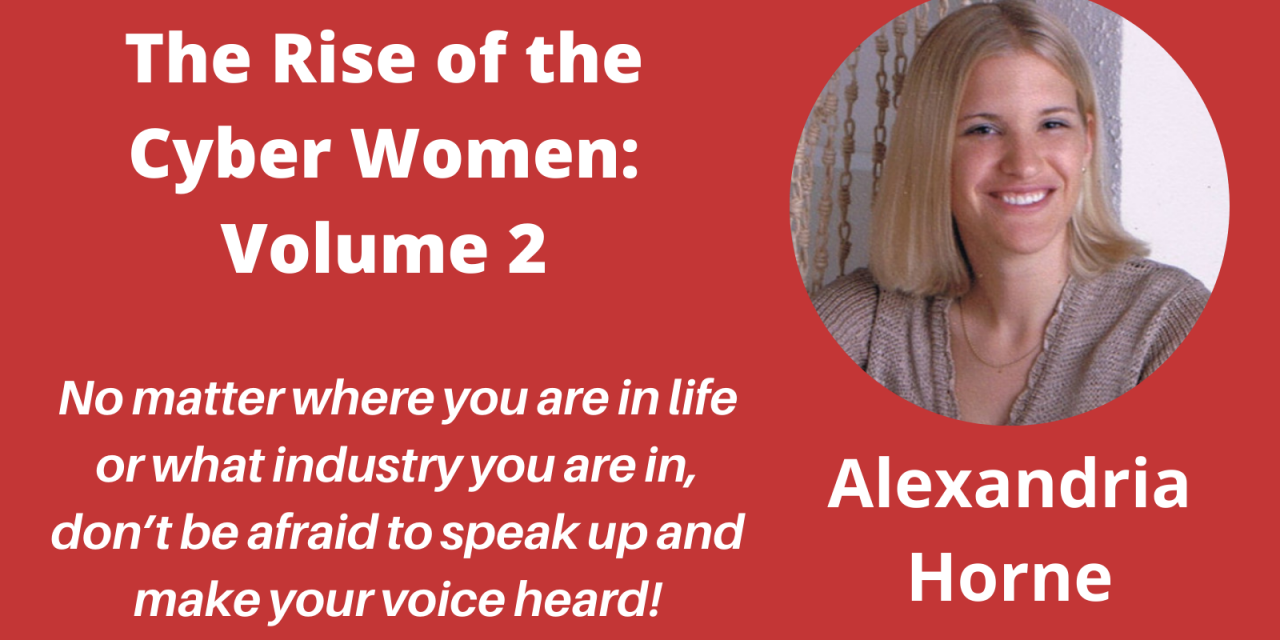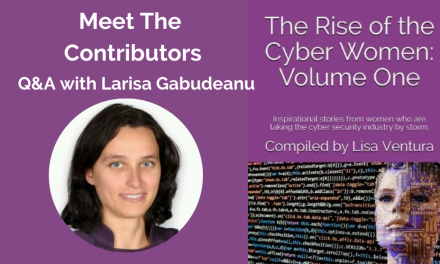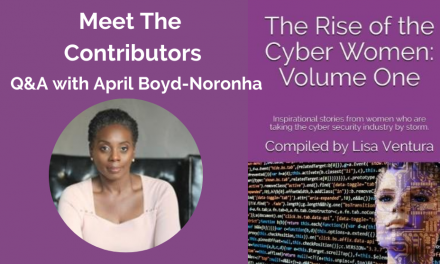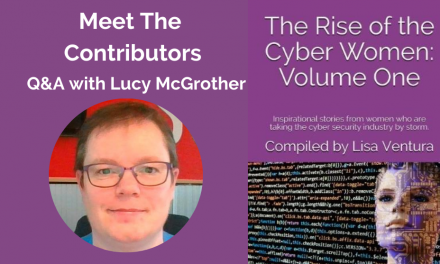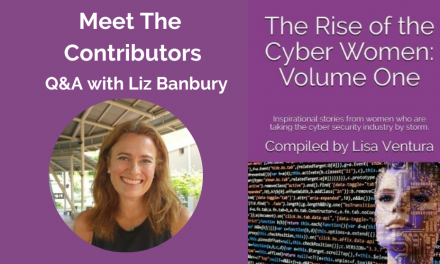Name: Alexandria Horne
Job Title: Faculty – Web Design and Development
Company: Clark State College
Location: Springfield, Ohio
Tell us an interesting or fun fact about you:
I have a passion for conservation and wildlife. I partake in wildlife rehabilitation, am a board member for a local chapter of the National Audubon Society, foster kittens for a local animal shelter, and am a volunteer SCUBA diver at a local zoo.
What drew you towards a career in cyber security?
I’m somewhat of an “accidental programmer.” I did my undergraduate work at Purdue University with a desire to go into meteorology. I actually took a C++ elective here and hated it! Eventually, I found my way to the University of Cincinnati where I earned my masters in geography with a focus in GIS. Working in the geospatial industry, I quickly learned how valuable programming is and how it can be applied to every industry (yes, even C++). Since then, I’ve become a full stack developer with a strong focus in cybersecurity.
What do you enjoy most about what you do in the industry?
What I love most about cybersecurity (and technology in general) is that it is always changing. It is essential to continue learning throughout your career. What I enjoy most about my current position is interacting with students and mentoring them throughout their studies and into their careers.
What things are the most challenging in your role?
The goal of the Web Design and Development program that I coordinate is to develop well-rounded full stack developers. That is a large amount of information to fit into a 4-year program. In addition, students must also meet state general education requirements. Deciding what gets included into the program and what doesn’t can be quite challenging.
Have you come up against any challenges or roadblocks and if so, what were they and how did you overcome them?
While working in cybersecurity at GE, I quickly learned that the company maintained a culture of fear. Even the most basic cybersecurity requirements were ignored, fraud was rampant and engineers who voiced concerns about aviation engine safety were promptly retaliated against. GE is also notorious for its horrific treatment of women and minorities. Many of us attempted to change this culture from the inside only to experience GE’s brutal retaliation. The company takes it one step further by maintaining a corrupt internal investigation system and using forced arbitration to hide its systemic illegal activities.
After being retaliated against for raising concerns, I began networking with others that had experienced similar abuse at GE. Soon, we had gathered hundreds of first-hand accounts of this systemic abuse. Working with legal counsel and public relations specialist, we filed the necessary federal complaints and are working with major media outlets to expose GE’s toxic culture, dangerous aviation practices and nearly a century of discrimination against women and minorities.
We are also working with women from TESLA, Google, Microsoft, and many other companies to put pressure on Congress to abolish forced arbitration.
What have been your career defining moments?
The defining and undoubtably the most challenging moments of my career have been speaking up against established corporate cultures that tolerate and even encourage discrimination and retaliation. Despite the threats received and knowing that I would be retaliated against, I could not stay silent about the abuse many women face in the workplace. If we stay in the shadows, nothing will change. If we join together and make it clear that we will no longer tolerate the abuse, that’s when change will happen.
What changes have you seen in the cyber security industry in the time that you have been in it?
I am seeing governments around the world pass legislation to address cybersecurity vulnerabilities. The EU’s GDPR, Britain’s Cyber Essentials, and the U.S. CMMC. It’s great to see governments recognizing the importance of cybersecurity and taking actions to make sure it is in place. What I have witnessed here in the United States is that the government is reluctant to penalize defense contractors for failing to establish mandatory cybersecurity safeguards. It is well known and well publicized. However, it is cheaper for these large defense contractors to pay the monetary penalty than to actually establish a robust cybersecurity regime.
What trends or changes do you think we will see in cyber security in the next 10 years?
Cyber espionage has been a significant risk for decades. We have known about this but are just now starting to take significant actions to decrease vulnerabilities. Also, small businesses are now beginning to realize how vital cybersecurity is. I anticipate the cybersecurity profession will continue to grow and evolve rapidly in the coming 10 years.
How much job demand have you seen for cyber security professionals, and what things to you think will shape this demand in the coming years?
In the USA, it is painfully evident that a significant talent shortage already exists. Demand for cybersecurity positions is high and looks to increase in the coming years.
Has the coronavirus pandemic impacted on your career, and if so in what ways?
You will be hard pressed to find someone who has not been impacted by the coronavirus pandemic. The biggest impact I have seen in my career is the increased acceptance of working remotely from home. However, this new trend also brings with it a new set of cybersecurity risks that need to be addressed.
What soft skills do you think are important for women in cyber security to have?
Communication is huge. A thirst for learning is also essential as things are always changing in the world of technology and cybersecurity.
Why do you think more women should consider a career in cyber security?
Women often bring a different approach to the workforce. This is needed now more than ever.
How does someone from another industry make the move into cyber security?
The great thing about cybersecurity is that no matter what career field you are in, cybersecurity is essential! Start by educating those at your current company about the importance of cybersecurity and push for policies that emphasize the importance of proper cyber hygiene.
What advice would you give to a women looking to make the move into cyber security?
Many believe that you must have a degree in cybersecurity or spend thousands on training to break into the field. This is not necessarily the case. Research the many certifications available. A few certifications are sometimes all it takes to move into the cybersecurity world.
In your perspective – what are the biggest cyber security threats to companies presently?
The biggest cybersecurity threat companies face are often monsters of their own making. Lack of cybersecurity awareness and standards or simply ignoring cyber threats unfortunately remains common practice for many companies. Anyone who is knowledgeable in cybersecurity will tell you, it’s not if you get hacked, but when.
Do you think it is important to close the gender gap in cyber security and if so, how do you think this could be done?
Closing the gender gap is cybersecurity is absolutely vital. There are many steps that need to be taken in order for this to happen. The first, and possibly most important step, is to make forced arbitration illegal. Forced arbitration is used by companies to hide their illegal treatment of employees; especially women and minorities.
While the situation in the cyber security industry has marginally improved in recent years, it is still a very male dominated world. What are your thoughts on this, and have you seen an improvement yourself?
The good news is that in recent years, more attention has been drawn to this issue. Most of this attention has come from women who are willing to speak up and share their stories. While we still have a long way to go, I’m hopeful that progress will soon be made.
Finally, is there anything else you would like to share with our readers?
No matter where you are in life or what industry you are in, don’t be afraid to speak up and make your voice heard!
“The Rise of the Cyber Women: Volume 2” is available now via the links below:

